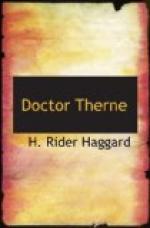“Oh, very well. Stephen Strong is my name, and I may tell you that it is good at the bottom of a cheque for any reasonable amount. Well, I’m here to go bail for that young man. I know nothing of him except that I put him on his back in a ditch in an argument we had one night last winter in the reading-room yonder. I don’t know whether he infected the lady or whether he didn’t, but I do know, that like most of the poisoning calf-worshipping crowd who call themselves Vaccinators, this Bell is a liar, and that if he did, it wasn’t his fault because it was God’s will that she should die, and he’d a been wrong to try and interfere with Him. So name your sum and I’ll stand the shot.”
All of this tirade had been said, or rather shouted, in a strident voice and in utter defiance of the repeated orders of the chairman that he should be silent. Mr. Stephen Strong was not a person very amenable to authority. Now, however, when he had finished his say he not only filled in the bail bond but offered to hand up a cheque for 500 pounds then and there.
When it was over I thanked him, but he only answered:—
“Don’t you thank me. I do it because I will not see folk locked up for this sort of nonsense about diseases and the like, as though the Almighty who made us don’t know when to send sickness and when to keep it away, when to make us live and when to make us die. Now do you want any money to defend yourself with?”
I answered that I did not, and, having thanked him again, we parted without more words, as I was in no mood to enter into an argument with an enthusiast of this hopeless, but to me, convenient nature.
CHAPTER V
THE TRIAL
Although it took place so long ago, I suppose that a good many people still remember the case of “The Queen versus Therne,” which attracted a great deal of attention at the time. The prosecution, as I have said, was set on foot by the relations of the deceased Lady Colford, who, being very rich and powerful people, were able to secure the advocacy of one of the most eminent criminal lawyers of the day, with whom were briefed sundry almost equally eminent juniors. Indeed no trouble or expense was spared that could help to ensure my conviction.
On my behalf also appeared a well-known Q.C., and with him two juniors. The judge who tried the case was old and experienced but had the reputation of being severe, and from its very commencement I could see that the perusal of the depositions taken in the magistrates’ court, where it will be remembered I was not defended, had undoubtedly biased his mind against me. As for the jury, they were a respectable-looking quiet set of men, who might be relied upon to do justice according to their lights. Of those who were called from the panel and answered to their names two, by the way, were challenged by the Crown and rejected because, I was told, they were professed anti-vaccinationists.




